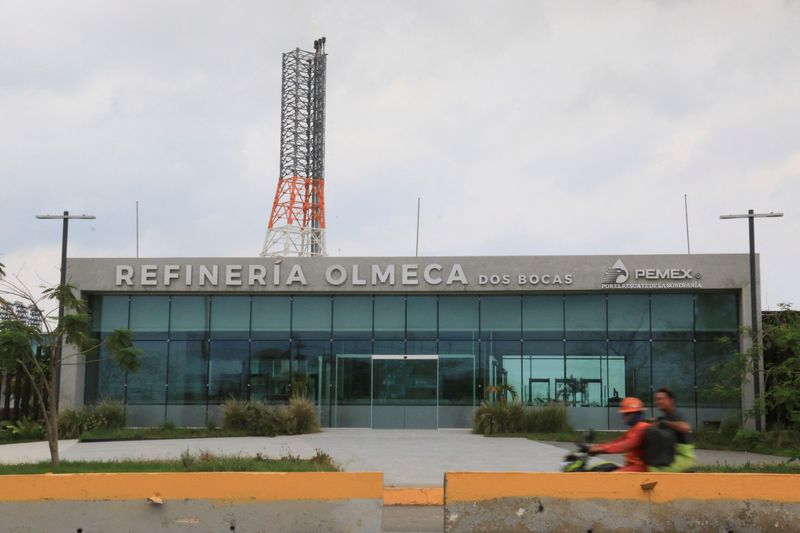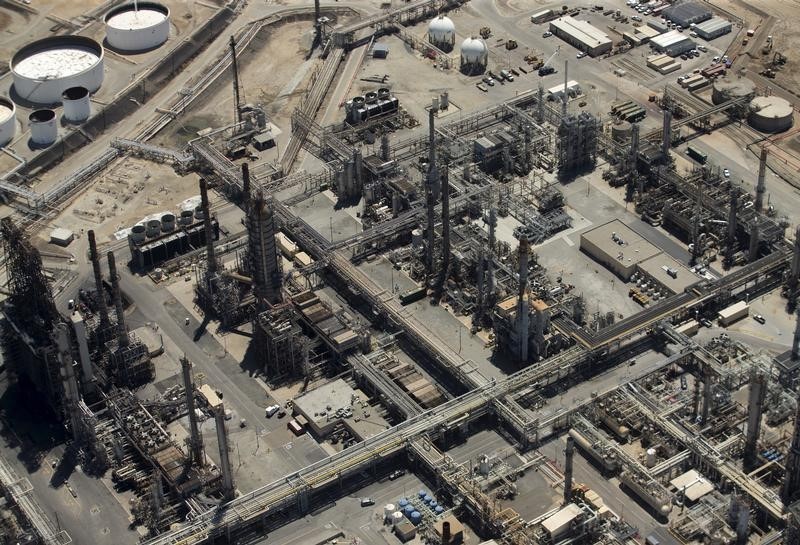By Stefanie Eschenbacher, Shariq Khan and Trixie Yap
MEXICO CITY/NEW YORK/SINGAPORE (Reuters) – Mexico is trying to import more motor fuel next year than it previously planned to offset delays in starting up its new Olmeca refinery, half a dozen traders said, adding about turn by state energy company Pemex.
Next year’s purchases indicate the refinery won’t be ready anytime soon, putting a damper on the legacy of outgoing President Andres Manuel Lopez Obrador, who ordered it after being elected in 2018 to divert the country from expensive imports.
Pemex, the world’s largest debtor, is a major crude oil producer but relies heavily on gasoline and diesel imports as its six aging refineries struggle to process the heavy Mayan oil and instead produce record amounts of fuel oil.
Earlier this year, Pemex had told suppliers it planned to significantly reduce imports of both fuels as the 340,000 barrel-per-day refinery finally operated at full capacity, the market sources said.
However, Reuters revealed last month that the refinery was unlikely to produce commercially viable fuels from crude oil before the end of the year, as engineers were still working on key parts more than two years after it opened.
The Paris-based International Energy Agency was also skeptical. In its June report, it wrote that the refinery was unlikely to be operational until the fourth quarter of next year.
Reuters was unable to determine how much Pemex previously planned to cut imports for next year. Pemex did not respond to a request for comment.
However, Mexico is now again looking for deals that would guarantee fuel supplies for the rest of this year and next year, and has made inquiries in the US and across Asia, the traders said.
Pemex traders are looking for similar volumes to those they previously imported, said a trader at a major commodities house. This was confirmed by another American trader who worked for a major refinery in Latin America.
They have also made inquiries with Chinese refiners in the past two weeks, but no deals have been struck yet, two Asian traders said.
New deals for deliveries in 2025 would contradict what Pemex CEO Octavio Romero said earlier this month: that Mexico would drastically cut fuel imports in the coming months.
The Olmeca refinery would start in the coming days, he said at the time. New coking plants at the Tula and Salina Cruz refineries will also boost production above national demand and Pemex would have a surplus, he added.
In the first five months of the year, Pemex produced 306,547 barrels per day of gasoline and 181,565 barrels of diesel per day at its six domestic refineries, official data showed. It imported 358,545 barrels per day of gasoline and 128,215 barrels of diesel per day.
SPOT PURCHASES DURING DELAY
Without the new refinery operating at full capacity, low imports could cause a fuel shortage next year that would embarrass the government and new President Claudia Sheinbaum, three Mexican traders said.
Pemex and the government have postponed at least a dozen times the start-up date of the refinery, whose costs have more than doubled in recent years to about $17 billion.
Mexico typically imports most of its fuels from the U.S. because shipping from Asia takes longer and is more expensive, although price fluctuations in Asia can make arbitrage economics.

Pemex bought at least three spot gasoline cargoes of about 300,000 barrels each from Asia last week – likely from China and Singapore – as the arbitrage economics were lucrative, the traders added.
However, it would be more challenging to ship cargoes from Northeast or Southeast Asia to Mexico on a contractual term basis, as this means the arbitrage must be profitable for the entire period.


